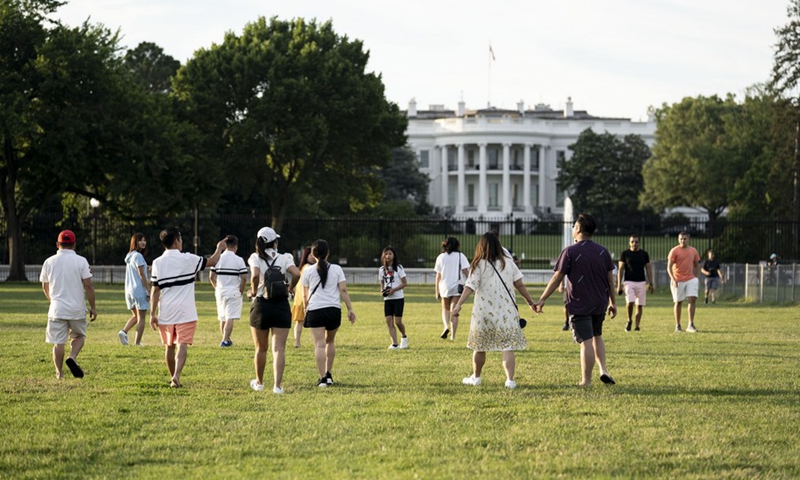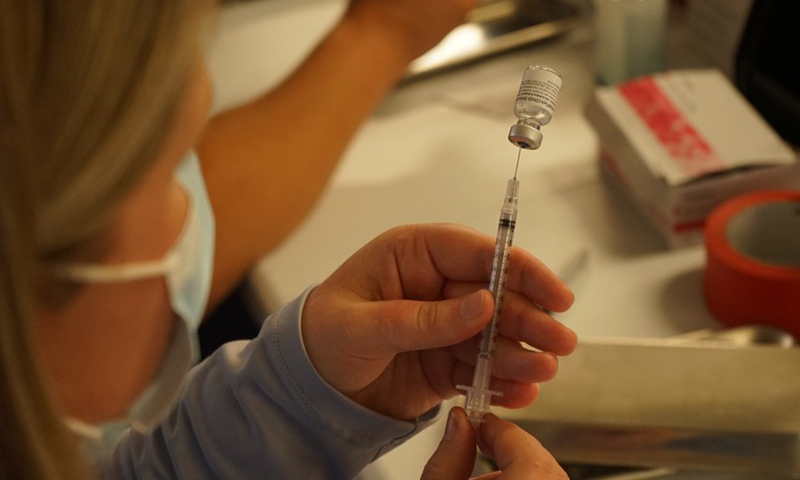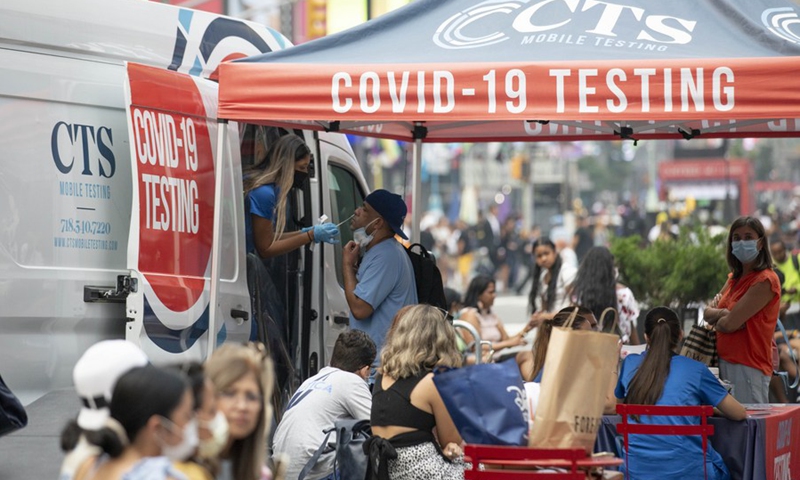
People wander near the White House in Washington, D.C., the United States, June 22, 2021.(Photo: Xinhua)

A medical worker prepares a dose of COVID-19 vaccine at the Universal Studios Hollywood in Los Angeles, California, the United States, June 18, 2021.(Photo: Xinhua)

A man receives COVID-19 test at a mobile testing site in Times Square, New York, the United States, July 20, 2021. (Photo: Xinhua)
The United States is facing a resurgence of new COVID-19 infections nationwide, due to the rising cases of the more contagious Delta variant fueled by misinformation about the virus and politicization of the nation's response to the pandemic.
Going in Wrong Direction
COVID-19 cases are on the rise in nearly 90 percent of U.S. jurisdictions, with outbreaks in parts of the country that have low vaccination coverage, said the U.S. Centers for Disease Control and Prevention (CDC) in its latest weekly report.
As of July 22, 35 percent of U.S. counties were experiencing high levels of community transmission, according to the CDC.
Health experts blamed the recent surges on low vaccination rates and the accelerating Delta variant transmission.
The United States is "going in the wrong direction" on the pandemic with about half of Americans not yet vaccinated and the Delta variant accounting for more than 80 percent of COVID-19 cases in the country, warned Anthony Fauci, U.S. top infectious disease expert, on Sunday.
Asked on CNN's "State of the Union" program about a model projecting a worst case scenario of 4,000 COVID-19 deaths a day in the country if vaccination rates do not improve, Fauci, who also serves as President Joe Biden's chief medical advisor, said "it's not going to be good."
About 48.8 percent of the U.S. population is fully vaccinated against COVID-19, and 56.4 percent of the population has received at least one shot as of July 22, according to the CDC.
CDC Director Rochelle Walensky said earlier this month that the coronavirus outbreak will become a "pandemic of the unvaccinated," and encouraged Americans to get the jab.
Politics Plays A Role
The United States is "one of the few countries with enough vaccines at its disposal to protect every resident," and yet it has one of the highest rates of vaccine hesitance or refusal, noted a recent story by New York Times.
The vaccination lag is "a hydra-headed problem," and some responsibility "lies with the frank refusal of conservative leaders -- often Republicans -- to champion the vaccines," said the report on Sunday, adding that misinformation "emanates from all parts of the cultural spectrum."
It was "disappointing" that politics played a role in whether people decided to get the vaccine, lamented Arkansas Republican Governor Asa Hutchinson in a recent interview with "Full Court Press" news show.
Hutchinson said that Arkansas' political leaning might explain the state's lower vaccination rate. "We have a lot of resistance. It's a conservative state. Sometimes conservatives are hesitant about the government, and we've just got to counteract that by getting better information to them, building confidence."
The politicization of the nation's response to COVID-19 has been a consistent theme since the pandemic began.
A Washington Post-ABC News poll released earlier this month found 47 percent of Republican respondents said they were unlikely to get vaccinated, compared with 6 percent of Democrats who said so. Among Republicans, 38 percent said they definitely would not get the shots.
"Fewer than half of House Republicans are vaccinated as of May, compared with 100 percent of congressional Democrats. For months, some Republican lawmakers including Senators Ron Johnson of Wisconsin and Rand Paul of Kentucky, and conservative news commentators like Tucker Carlson, have voiced their skepticism of vaccines, loudly and insistently," said the New York Times report.
GOP Representative Clay Higgins of Louisiana, a coronavirus skeptic who opposes vaccine mandates, said Sunday that he was infected with the coronavirus for the second time, NBC news reported.
Last week on Capitol Hill, Fauci vehemently rejected a Republican senator's insinuation that the United States helped fund research at a Chinese lab being targeted in a smear campaign launched by some U.S. politicians.
"Senator Paul, you do not know what you're talking about ... If anybody is lying here, senator, it is you," said Fauci when he angrily confronted the Kentucky Senator in testimony.
Louisiana has one of the highest rates of new infections and lowest vaccination rates in the country.
As the virus spreads largely in GOP regions with low vaccination rates, some Republican leaders have begun championing vaccination.
Senator Mitt Romney, Republican of Utah, said Wednesday that "the politicization of vaccination is an outrage and frankly moronic."
Misinformation Fans Vaccine Hesitancy
Misinformation regarding the virus and vaccines, which is spreading like wildfire across social media platforms, has also undercut Biden's vaccination push.
Both Pfizer and Moderna, two of the main manufacturers, said their vaccines are safe and protect against the deadly virus. Yet millions of Americans are refusing to get the vaccines, on fears of side effects or other worries -- many of which are posted on social media.
Social media users called "anti-vaxxers" have posted ridiculous conspiracy theories on the vaccines.
U.S. Surgeon General Vivek Murthy recently issued a warning that vaccine misinformation spreading online was partly responsible for Americans refusing the vaccines, leading to avoidable deaths and illness.
Social media companies need to understand that they have played a decisive role in the spread of wrong information on the pandemic, said Murthy, noting while they have taken steps to crack down on this, it has not been enough.
White House press secretary Jen Psaki made recent headlines when she revealed the Biden administration was flagging social media posts it believed were threatening the government's vaccine goals.
But Republicans and civil libertarians are blasting big tech for what they claim as an attempt to regulate speech.
Noting the U.S. Constitution, Republican Strategist and TV news personality Ford O'Connell echoed the argument of many conservatives, telling Xinhua that when the government coordinates and delegates its powers to social media, "it's a 1st Amendment violation."
The issue also underscores the deep divide between liberal and conservative Americans.
Brookings Institution Senior Fellow Darrell West told Xinhua that the anti-vaxxers "definitely lean right and tend to be (Donald) Trump supporters."
"Even though Trump himself was vaccinated, (anti-vaxxers) believe the misinformation that vaccines are dangerous and medical experts are not trustworthy. That makes them unwilling to obtain a vaccine even though nearly all the fatalities now are taking place among those who did not get vaccinated," West said.
The pandemic has killed over 611,000 people in the United States as of Monday, according to data compiled by Johns Hopkins University.
